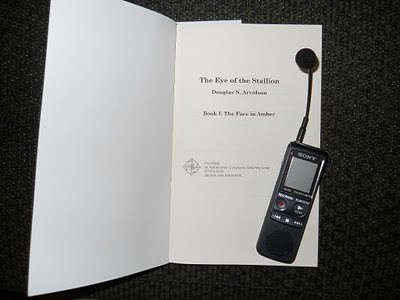Douglas Arvidson is a past winner of the WICE/Paris Transcontinental International Short Story competition. His short fiction has been published in Paris, Prague, and in literary magazines in the United States and he was recently invited to be a staff writer for the Prague Revue, a cutting-edge, online literary journal (http://bit.ly/1mMT6ZC). The novels in his fantasy series, The Eye of the Eye of Stallion, include The Face in Amber, The Mirrors of Castaway Time, and A Drop of Wizard's Blood. His new novel, Brothers of the Fire Star, was selected as a finalist in the ForeWord Reviews 2012 Book of the Year national awards and as a finalist in three categories in the 2013 New Mexico-Arizona Book Awards: Action Adventure Fiction, Historical Fiction, and Young Adult Fiction. It has become part of the pantheon of Pacific literature and is now included in school literature programs. Brothers of the Fire Star is an adventure story set in the Pacific during World War II and concerns two boys of different races and cultures who escape the island of Guam in a small sailboat when the Japanese army invades. They must then struggle to survive as they master the secrets of the ancient Pacific navigators. Appropriate for young adults as well as adult readers, Brothers of the Fire Star is available on Barnes & Noble, Amazon.com (http://amzn.to/1j3axVk) and Crossquarter.com. Visit the author's website: douglasarvidson.com
Wednesday, July 28, 2010
Recording My Writing: It's Not as Easy as They Make It Sound
“The fluent reader sounds good, is easy to listen to, and reads with enough expression to help the listener understand and enjoy the material.” - Charles Clark, "Building Fluency: Do It Right and Do It Well!" (1999)
I'm not ashamed to admit that I have what is called a "trained speaking voice." That is, I went to Emerson College as a broadcasting/speech major for almost three years and there, as brand new freshmen, we were required to undergo an assessment of our speech and suggestions were made for improvement. There followed voice and articulation classes, public speaking courses, stints as a dj on the college radio station, much self analysis and critical assessments from instructors/professors, etc. In later years I became a speech/language pathologist and worked part time as a professional voice and radio news anchor.
So, after all that, the idea of recording my books myself seemed like the natural, inevitable thing to do. I have a friend in New England who built a great little recording studio out in the country, all set up with digital mics and amps and boards and he offered to let me record there for free (I accepted, but will pay him).
This is scheduled to happen in October, and meanwhile, I'm setting about practicing, rehearsing, getting the hang of it. Quick lesson learned? Despite all my training and background, it ain't gonna be easy. I bought a second digital recorder (I've lost the first one I bought last winter. It's around here in this mess somewhere), and now spend a hour each day trying to get it right.
The voice is there. That's not an issue. What is an issue is slowing down---slow, slow, slow. Like most people reading aloud, I go too fast. I start out fine, but every so gradually, the maddening imp of my hyper personality creeps into my delivery. When this happens, words tumble on top of each other and first and last syllables are garbled into gibberish.
Next, the characters. I'm not pretending to be an actor and do all the parts. I'm just reading to, say, someone sitting in a car driving along. I mean, how can a man with a baritone voice do a woman? Or a callow youth? The idea is not to try. Let the prose tell the listener who is speaking and then just make enough of a change in your voice to "imply" the character. It seems to work okay, but there are many strange characters in my books and I've got to get them right.
The last problem is the prose itself. I've been over the text in this book a hundred times if I've been over it once. I've edited, re-edited, read and re-read the manuscript for clumsy phrasing and meat-hook syntax. And the book itself is in it's third printing, re-edited each time. Should be perfect, right? Right, but I still find myself tooling along just fine, enjoying interpreting my writing for an audience, when--suddenly--a prose pot hole takes my tongue and slaps it around in my mouth. I struggle to regain my articulatory composure and then give up and hit the pause button.
But I've got two months to get it right. Back to work. Slow, slow, slow. Once more with feeling.
Subscribe to:
Post Comments (Atom)

No comments:
Post a Comment